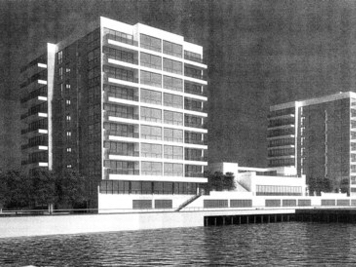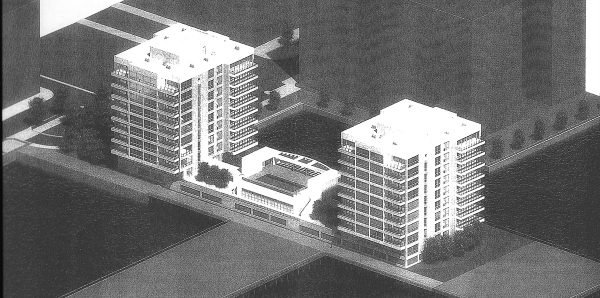For the past eight years, the City of Hoboken, along with the Fund for a Better Waterfront (FBW) and the Hudson Tea Building, has been trying to protect the northernmost pier in town from being developed into a 78-unit, 11-story, twin-tower building through various court proceedings. New Jersey Courts have thwarted these efforts by handing down a series of ill-considered rulings. But last Monday, the New Jersey Supreme Court decided to take up this case. The high court hears but a small percent of cases appealed from the lower courts, so this represents a dramatic turn of events between the developer, Shipyard Associates, and opponents.
Since Mayor Ravi Bhalla took office in January 2018, negotiations to settle this protracted legal battle have resumed. The potential Supreme Court ruling has clearly shifted the balance of power in these talks. Yet, what may be more important are the legal issues that need to be resolved that go the heart of a municipality’s right to enforce local ordinances that protect the public’s health and safety.
In 1997, the Hoboken Planning Board granted site plan approval for the 1160-unit Shipyard project on nine acres of prime real estate at Hoboken’s north waterfront. The site plan and Board resolution included the provision for open space on the final development parcel, Block G, two-thirds of which is on a pier jutting into the Weehawken Cove. A developer’s agreement between the Shipyard Associates, the City of Hoboken and Planning Board also included this provision for open space as did the 1997 state waterfront permit.
But fourteen years later, shortly after building the last of the 1160 residential units, Shipyard Associates — brothers Michael and David Barry — reneged on their agreement and sought to replace the open space with this project dubbed the Monarch Towers.
Hoboken’s mayor and city council, neighbors and FBW judged this to be an egregious breach of the Planning Board approval and developers agreement. The City of Hoboken, the Hudson Tea Building Condo Association and FBW challenged the state’s 2011 waterfront permit, sought to enforce the developer’s agreement and defended the validity of the City’s amended flood ordinance.
What followed was a series of adverse court rulings. Shipyard Associates has prevailed despite court precedents to the contrary and the usual norm of New Jersey Courts deferring to municipal land use boards. In this matter, the courts have shown an open hostility to the Hoboken Planning Board and the City’s efforts to hold Shipyard to its obligations under the developer agreement, and subsequently to comply with its flood prevention ordinances adopted in response to Superstorm Sandy.
In a decision handed down on January 7, 2019, a New Jersey Appellate Court panel ruled that the City of Hoboken did not have the authority to enforce its amended flood prevention and corresponding zoning ordinances, which, among other things, prohibited residential and commercial projects beyond the high tide line. This ruling undermined the authority of municipal governments to administer local health and safety laws.
In 2012, the City of Hoboken adopted the two ordinances, one environmental and the other zoning, in response to Superstorm Sandy. The ordinances were written based on recommendations from a consultant and recent guidelines set out by the NJDEP and FEMA.
The consensus among these agencies and the consulting firm was that residential development projects on piers, over bodies of water, put people in harm’s way. Superstorm Sandy confirmed this peril as surging waters overwhelmed piers, stranding residents at pier projects and placing overwhelmed rescue workers at risk. FEMA re-designated Hoboken’s entire mile-and-a-half coastline to be in the Coastal High Hazard or “V” zone.
Attorneys representing the City of Hoboken and FBW argued that New Jersey case law and Municipal Land Use Law clearly supports the amended flood ordinance and corresponding zoning code, adopted to protect the public’s health and safety and that these are enforceable, even if the developer had received final site approval prior to the adoption of the ordinances.
In response to a January 2018 Appellate Court decision, the City of Hoboken and FBW filed a Notice of Petition for Certification to appeal to New Jersey’s Supreme Court. FBW is represented by attorney Renee Steinhagen of the New Jersey Appleseed Public Interest Law Center as well as the Eastern Environmental Law Center. The Supreme Court will likely take up this case on its fall calendar.
Related documents
Petition for Certification 2-6-2019
Appellate Decision January 2019
FBW letter to Mayor and Council 9-20-2016
Related links
Final legal dispute over Monarch Towers reaches NJ Supreme Court
NJ Supreme Court will rule on Monarch Towers dispute
Appellate Court ruling disregards well-established New Jersey land use case law
Monarch Towers sparks legal arguments over automatic approvals, changed circumstances, etc.
Appellate Court will hear appeal of 3 Monarch Towers cases
City settlement would shower tens of millions in benefits on Shipyard developers
Settlement proposed to end 5 year legal battle over Monarch Towers
Did NJDEP ignore its own coastal zone regs in granting permit? Appellate Court to decide
‘Rapacious’ developer must defend broken agreement in Appellate Court
Monarch towers case goes to Appellate Court
Monarch Towers litigation grinds on as public opposition persists
Federal judge grants FBW opportunity to help defend Hoboken’s flood ordinances
Developers challenge Hoboken flood ordinance in federal court
Judge grants automatic approval for controversial Monarch Towers
Monarch Towers described as classic case of bait and switch
Shipyard’s plan to privatize pier



